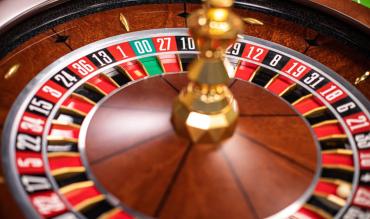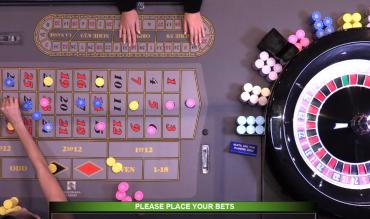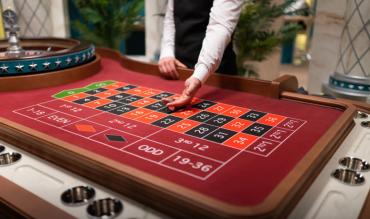We are now going to take a dive, a deep dive my readers, into a totally rational way of playing roulette and use this playing method to attempt to overcome the randomness of the game and beat the house. Yes, roulette is strictly a random game as we all know.
This system is called the “Ontological Method” for beating roulette (think of it as OM as in the Indian mantra). It is based on the concept that rationality can overcome anything in the random world, thereby making such randomness obey what we, rational creatures, want. In short, we are ultimately in control.
Can the randomness of roulette be flipped to favor us instead of favoring the casino? Will it work? We know how the casino gets its edge at roulette. Yes, the game is random but the casino short-changes the player who wins. That sets up the house edge, not the randomness of the game. If the game paid based on true odds, there would be no house edge and there would be no player edges either.
On the American double-zero wheel (0, 00), there are 38 pockets for the ball to land in but the ball can only come to rest in one of those pockets. The odds are therefore 37-to-1 for each and every pocket to be the winner. However, the payout from the casino is 35-to-1 for the player who guessed correctly, not 37-to-1. That skimps the player two units of a fair win. The house edge is therefore 5.26%.
[Please note: The casino needs to create an edge in order for it to continue to operate. Yes, the game is random but how the casino pays Is not random. It is carefully considered.]
On the European/French single-zero game (0) there are only 37 pockets and the odds are therefore 36-to-1 for the ball to come to rest in any one pocket. However, the payoff for a winning guess is 35-to-1.
Again, the casino skimps the player by keeping one unit of the players otherwise fair odds. The house edge is 2.7% – much better than the American game.
I’ll ask you, in your estimation will my system actually work and give the player a long-term edge at roulette? I am sure at this moment you are answering my question with no hesitation and I am guessing that your estimation is correct. (Hey, come on, you know the answer to this question.)
Logical Order versus Random Results
The ball spins around the top of the wheel, then heads down the side (where it may hit some bumpers) and then it lands in the pockets and bounces about, from here to there. During the start of this journey the dealer tells the players they cannot make any more bets. Finally, the ball lands in a pocket and that is the winning pocket!
Yes, this is strictly a random process. Now comes the brilliant logic of my unique ontological argument.
The numbers on the roulette layout are in numerical order. There is a definitive logic about these numbers. At the game you have bets for individual numbers, groups of numbers, colors, propositions such as odd/even and the like. The players have many betting options.
However, there is a slight problem with the way most roulette players wager their hard-earned money. Their plans are basically not logical. They just guess about this or that outcome. They do not apply an ongoing logic for every spin; a logic that continues in the future of play that will destroy the randomness of the game and allow the player to win in the long run.
This is where they miss out on beating roulette. Rationality must win out in the betting arrangements the players use or they must lose in the long run.
[Please note: There is a real truth here that must be seen for what it is. I hope you are seeing it.]
Step One
Start with Even-Money Bets
There are three even-money bets at roulette; the odd/even, red/black, high/low. You get to bet one side of the equation with each spin of the wheel.
These bets are not 50-50 propositions between players and casinos. The casino will win 20 decisions and the player will win 18 decisions on the American game. On the European/French game the casino will win 19 bets and the player will win 18 bets. They are called “even-money” because a win pays even money.
We are now going to do logical run-throughs of the even-money bets. Let us say we bet $50 per wager. You can use the unit bet that you normally use but every bet must be of the same amount.

You bet red first, then you bet black, then you bet odd, then you bet even, then you bet high, then you bet low. You have made six even-money bets. You have wagered $300. What were the results?
Now you bet the next series of propositions, the dozens. You bet $50 on the first dozen, then $50 on the second dozen, then $50 on the third dozen. You have wagered $150 on the dozens. Payouts are 2-to-1 per win. What were the results?
Okay, we now go to the columns proposition bets that also pay 2-to-1. There are three columns. You bet column one, next you bet column two, next you bet column three. You have wagered $150. What were the results?
In total, you have made six even-money bets, three dozens bets, and three columns bets – that’s 12 bets total – for an expense of $600.
Okay, now figure out where you stand in the game. Add up your wins and subtract your losses and see where you stand at this moment in time.
[Please note: A reminder. Just use your normal betting amount here. You do not have to use $50 per decision. Just make sure all bets are for the same amount. Do not overbet. Overbetting is illogical.]
Step Two
We now do the reverse of step one. We go backwards. First, we bet each column in reverse order, then the dozens in reverse order, then the even-money bets in reverse order.
You have again wagered $600. Where do you stand now? You have wagered 24 times on steps one and two combined for a total of $1,200. What were the results?
Decision Time
Okay, now you have a series of choices to make. Do you go back and repeat the order of your bets – meaning Step One repeats? And then to Step Two after that? Or do you move on to more dangerous betting concepts?
This is, of course, up to you.
I would go with two more times through steps one and two before heading into the deep waters of dangerous bets. Actually, I would not go into the dangerous waters at all but that’s just me. I am a really conservative player even with the OM at roulette. I only have a certain tolerance for risk.
But that might not be you. So here goes!
Dangerous Bets
We are now going to bet the triplet plan. That’s correct. We will bet three numbers at a time. Sometimes three-number bets are called the “street bets.” I like to call them triplet bets. Call them what you will.
Look over the layout and you can see that you have the following:
➔ 1, 2, 3 (the first triplet)
➔ 4, 5, 6 (the second triplet)
➔ 7, 8, 9 (the third triplet)
➔ 10, 11, 12 (the fourth triplet)
➔ 13, 14, 15 (the fifth triplet
➔ 16, 17, 18 (the sixth triplet)
➔ 19, 20, 21 (the seventh triplet)
➔ 22, 23, 24 (the eighth triplet)
➔ 25, 26, 27 (the ninth triplet)
➔ 28, 29, 30 (the tenth triplet)
➔ 31, 32, 33 (the eleventh triplet)
➔ 34, 35, 36 (the twelfth triplet)
You will place your $50 on the outside line at the lower number for each triplet. Thus, if you want the triplet 25, 26, 27 then you place your chips on the line outside number 25 on the layout. That means you are betting all three numbers.
The payoff will be 11 to 1 on a win.
Here is a key point. You must make the bets in numerical order. That’s correct. You start with the first triplet and work your way to the twelfth triplet. Do not skip around. Then you are basically just playing a random game. We are trying to un-randomize the game. (Seriously, you are getting the true picture right now, yes?)
Overall, you are betting $600 for these bets. What were the results?

The Six Bet Sequence
This bet would be much easier on your bankroll as you are betting six numbers at a time. This would be your “in-between” bet between the Steps One and Two before going to the three-number Triplet bet. At $50 per six numbers, your outlay would be $300 and each winning bet brings in 5-to-1.
You must bet the six numbers this way and in this order:
➔ Group One: 1, 2, 3, 4, 5, 6
➔ Group Two: 7, 8, 9, 10, 11, 12
➔ Group Three: 13, 14, 15, 16, 17, 18
➔ Group Four: 19, 20, 21, 22, 23, 24
➔ Group Five: 25, 26, 27, 28, 29, 30
➔ Group Six: 31, 32, 33, 34, 35, 36
Those Pesky Zeroes
Yes, we have not yet taken account of those one or two annoying zeroes. When they were introduced to the game, the casino won on those zeroes and the players all lost all bets. Players could not bet the zeroes. They were called casino or house numbers and they spelled doom for the players’ bets.
This didn’t last long as the casinos made It easier for players to forget the house edge by allowing the players to bet all the pockets on the wheel. Just short change the payout and (maybe) nobody would get the true picture. I sometimes wonder if there are roulette players who actually know how the house establishes its edge at the game?
Some players bet those two green numbers when they are making proposition bets such as the even-money, etc. They think they are covering themselves from the house edge by putting a separate bet on the zeroes.
They aren’t.
You see, a player could bet any two numbers to “protect” him or herself and this is exactly the same as “hedging bets” with the one or two zeros. Most players who hedge this way do not know that they could hedge another way too with the same exact results. There is a focal mistake thinking hedging with the zeroes has any real meaning apart from hedging with any other one or two bets.
So here it is! Ignore the zeroes. Do not hedge your bets by making another bet that does not protect anything. Another bet just costs you more money over time.
What Bankroll is Needed for This Method?
As always, you have to determine your bankroll for playing this way (or any way at any game making any bets you wish to make) and this bankroll has to be safe from crippling your real life, your life away from the casinos and the gambling halls.
A large part of being a good casino player is keeping your finances contained, constrained and not easily diminished by poor decisions. Even if we play perfectly, we do have to take into consideration that the casinos’ house edges make us underdogs. Let’s not give them more of our bankrolls than we have to.
And that leads me to this:
The Facts of the Matter
I am sure many of you know that the Ontological Method of playing roulette is not an advantage technique. Hopefully, you knew this right off the bat when I asked you if it were.
I’ll grant it is a fun way to play but do not mortgage your house or borrow against your life insurance to play this method. OM is a great mantra but it isn’t a winning gambling technique. Fun, yes, but it is only just a fun way to play. Take heed of that. You cannot beat roulette in the long run unless, as Steve Wynn once said, you own the casino.
All the best in and out of the casinos!


